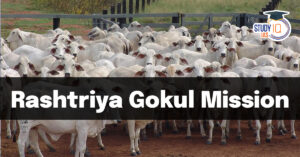Table of Contents
New Schemes for Farmers
The Union Cabinet has approved seven schemes to improve farmers’ lives and increase their incomes with a total outlay of Rs 14,235.30 Crore.
| No. | Scheme for Farmers | Budget |
| 1. | Digital Agriculture Mission | ₹2,817 crore |
| 2. | Strengthening Agricultural Education, Management and Social Sciences | ₹2,291 crore |
| 3. | Sustainable livestock health and production programme | ₹1,702 crore |
| 4. | Crop science for food and nutritional security | ₹3,979 crore |
| 5. | Sustainable Development of Horticulture | ₹860 crore |
| 6. | Strengthening Krishi Vigyan Kendra | ₹1,202 crore |
| 7. | Natural Resource Management | ₹1,115 crore |
Digital Agriculture Mission
- It is a government initiative aimed at developing Digital Public Infrastructure (DPI) for the agriculture sector.
- Objective:
- Improve Farm Management & Enhance Productivity.
- Provide services to farmers by integrating data and digital tools.
- Foundational Pillars:
- Agristack:
- It is a repository of all farmer information, including their identity, land records, coverage, income, insurance, loans, crop details, and revenue history.
- Consists of 3 databases: Farmers’ Registry, Geo-referenced Village Maps, and Crop Sown Registry.
- Krishi Decision Support System:
- It is a unique geospatial platform for Indian agriculture.
- It provides detailed data on fields, soil, weather, water levels and crop conditions accessible anytime & anywhere.
- Agristack:
- Other Components:
- Soil Profile Maps:
- Under this Mission, detailed Soil Profile Maps of about 142 million hectares of agricultural land will be prepared.
- A detailed soil profile inventory of about 29 million ha has already been completed.
- Digital General Crop Estimation Survey (DGCES):
- It aims to enhance the accuracy of crop yield estimates.
- Soil Profile Maps:
Strengthening Agricultural Education, Management and Social Sciences
- Objective: To prepare agriculture students and researchers for current challenges
- This scheme is under Indian Council of Agricultural Research (ICAR)
- Features:
- It emphasises using the latest technologies such as Digital DPI, AI, big data, and remote sensing.
- It also includes a focus on natural farming and building climate resilience.
- Aligns with the New Education Policy 2020.
Sustainable livestock health and production programme
- Objective: To Increase farmer’s income from livestock and dairy.
- This Scheme will Emphasise upon:
- Animal health management and veterinary education,
- Dairy production and technology development,
- Animal genetic resource management, production and improvement,
- Animal nutrition and small ruminant production and development.
Crop science for food and nutritional security
- Objective: To prepare farmers for climate resilience and provide for food security by 2047.
- It has the following pillars:
- Research and Education
- Plant genetic resource management
- Genetic improvement for food and fodder crop
- Pulse and oilseed crop improvement
- Improvement of commercial crops
- Research on insects, microbes, pollinators etc.
Sustainable Development of Horticulture
- Objective: To increase farmers’ income from horticulture plants.
- It comprises of the following:
- Tropical, sub-tropical and temperate horticulture crops
- Root, tuber, bulbous and arid crops
- Vegetable, floriculture
- Mushroom crops etc.
Strengthening Krishi Vigyan Kendra
- Objective: This initiative focuses on enhancing the capacity of KVKs across India, which play a critical role in agricultural research, education, and extension services
- Key objectives of this scheme include:
- Improved Agricultural Outreach
- Capacity Building and Training
- Promoting Innovation and Technology Transfer
- Enhancing Farmer Income
Natural Resource Management
- Objective: Aim to promote sustainable practices in the management of natural resources such as soil, water, and biodiversity.
- This initiative focuses on:
- Sustainable Use of Resources:
- Climate Resilience
- Water Management
- Soil Health


 Mukhyamantri Majhi Ladki Bahin Yojana, O...
Mukhyamantri Majhi Ladki Bahin Yojana, O...
 PM MITRA Parks, Objectives, Key Features...
PM MITRA Parks, Objectives, Key Features...
 Rashtriya Gokul Mission (RGM), Objective...
Rashtriya Gokul Mission (RGM), Objective...

























